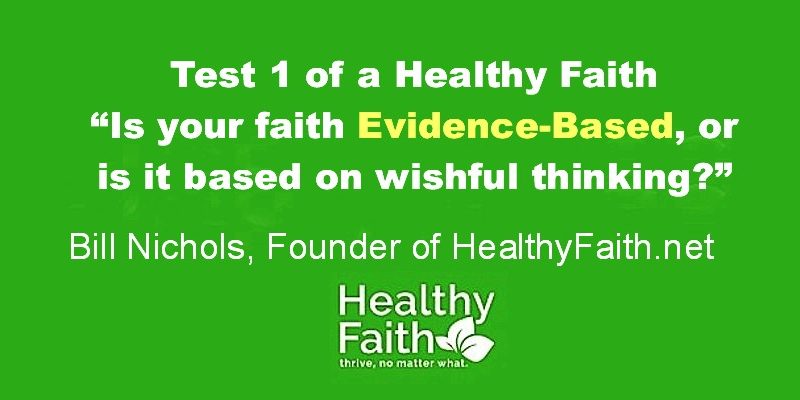“Is your faith EVIDENCE-BASED, or based on wishful thinking?”
Sarah says there is no hard evidence for God
When Sarah came home from college and told her parents she could no longer believe in God, she explained, “I wanted to believe but there was just no hard evidence for God. It seems to me that Christianity is no more than a system of beliefs based on wishful thinking and inspirational fairytales.”
Destructive warning-signs
Like too many, Sarah’s faith failed her because it was not evidence-based. It was unhealthy. In my experience, most unhealthy people had no idea as to just how sick their bodies or minds were until a crisis hit. Often, they had destructive warning-signs for a long time but got so used to them they assumed they were healthy.
The same is true for faith. If you don’t have an accurate understanding of what a healthy faith is, over time, you get so used to your unhealthy symptoms, that you don’t think of your faith as sick until it fails you miserably.
Characteristics of a healthy faith
Fortunately, just as there are some commonly-accepted characteristics of a healthy body, there are distinct characteristics of a healthy faith. Let’s see just how healthy or unhealthy your faith is.
The 1st test of a healthy faith
The first test of a healthy faith is the test of evidence. Is your faith evidence-based or just wishful thinking? You have a healthy faith if your faith is:
- Based on reliable evidence, not wishful thinking, superstitions, myths or fairytales.
- Time-tested, trustworthy, and depends on a real, personal God who acted in real historical events and in real people’s lives.
- Able to handle life’s toughest challenges. Your faith does not fall apart when trouble comes. It is not dependent on circumstances.
- Committed to the word of God. Your faith is healthy when you know the truthfulness and reliability of the Bible.
- Open-minded and respectful of others’ beliefs. Your faith is healthy when you compare it’s evidencd to that of others.
- Practiced in your routine daily life. Your faith is healthy when it is put to the test of your everyday challenges.
- Capable of handling threats and hard questions without getting angry or upset.
- Willing to listen, learn from other, and welcome new ideas and doubts.
If your faith does not past this test, you have work to do. You can develop a healthy faith and the first step is discovering the reliable evidence upon which your faith must rest.
Stay in touch for the second test of a healthy faith.
Bill Nichols, Founder of HealthyFaith.net

